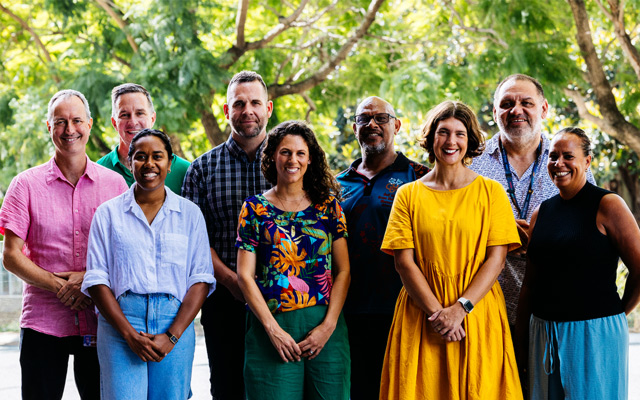Our role
Our network includes health professionals, consumers, caregivers and key stakeholders across Queensland who are dedicated to improving Aboriginal and Torres Strait Islander healthcare.
We’re committed to supporting better patient care and outcomes by:
- finding new and innovative ways to deliver high quality and evidence informed care
- improving quality, safety and efficiency across the system by connecting people
- developing training and resources for health professionals
- providing expert advice to Hospital and Health Services and the Department of Health.
Our focus
Our focus is strengthening and supporting Aboriginal and Torres Strait Islander peoples and their health rights. We put First Nations peoples views, priorities and knowledge at the centre of our work, and lead the conversation about First Nations health in Queensland. Our work helps health professionals make a positive difference to the health and life expectancy of First Nations peoples.

Membership
Membership is open to anyone with an interest in improving Aboriginal and Torres Strait Islander peoples health in Queensland.
Our members include:
- health professionals
- researchers and academics
- patients and community members.
We also have representatives from health groups, professional bodies and non-government organisations.
As a member, you'll be involved in working groups where you can share your experience, expertise and feedback. You'll have access to member resources, news and updates, and be invited to network events.
Co-chair
Dr Alicia Veasey (Zenadth Kes)
Senior Medical Officer, Obstetrics and Gynaecology
Co-chair
Patrick Rosser (Wiradjuri)
Program Manager First Nations Health Equity, Integrated Care, Gold Coast University Hospital
Steering committee
The Queensland Aboriginal and Torres Strait Islander Clinical Network Steering Committee sets the direction for our network. Membership is open to experienced health professionals and stakeholders who we appoint through an expression of interest process. Our culturally diverse members bring the skills and experience we need to improve Aboriginal and Torres Strait Islander healthcare. We require at least 75% of our committee members to be people who identify as Aboriginal and/or Torres Strait Islander.
Current projects and priorities
- Strengthening connections between Queensland Health Aboriginal and Torres Strait Islander staff through the First Nations Community of Practice
- Advocating for Aboriginal and Torres Strait Islander peoples perspectives within clinical governance systems, in areas such as safety and quality processes, clinical care and reporting racism
Contact us
Email: qldaboriginalandtorresstraitislandernetwork@health.qld.gov.au